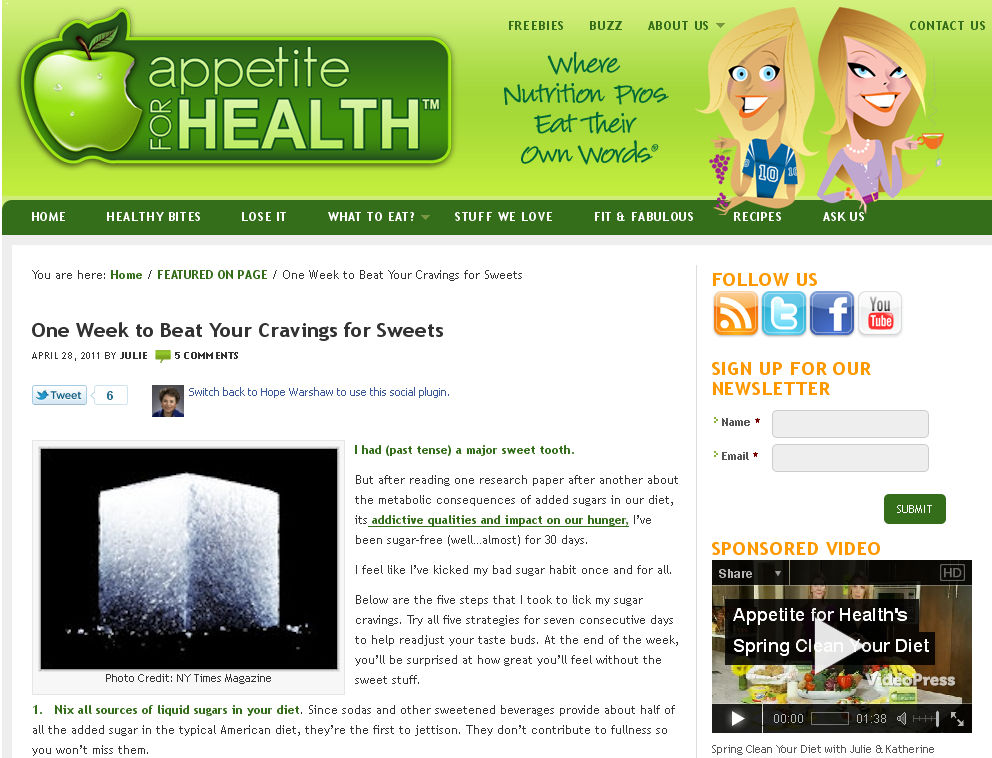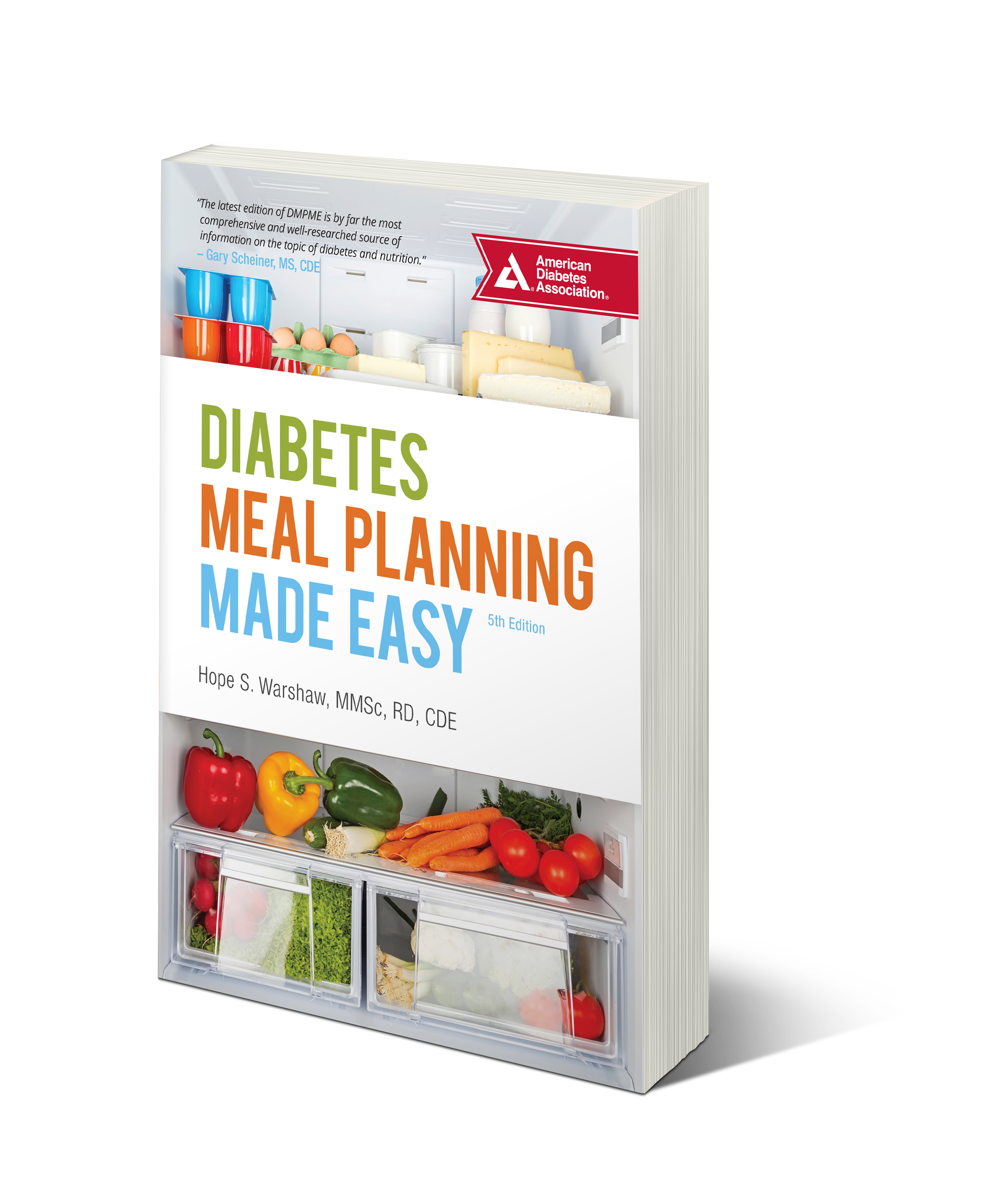7 Need-to-Knows about Sugar Substitutes
 You hear and see media headlines galore about how sugar substitutes may impact your health or weight loss efforts, ranging from eyebrow-raising to nerve-calming.
You hear and see media headlines galore about how sugar substitutes may impact your health or weight loss efforts, ranging from eyebrow-raising to nerve-calming.
No Need to Delete Sugars and Sweets
 This guest blog was written on request for appforhealth.com in response to Julie's blog A Week to Beat Your Cravings for Sweets. I want to thank Julie for being open to dialoging about key nutrition topics:
This guest blog was written on request for appforhealth.com in response to Julie's blog A Week to Beat Your Cravings for Sweets. I want to thank Julie for being open to dialoging about key nutrition topics:
Can people be “sugar addicted”? Not likely! But are we slurping, sipping and chewing too much sugar? Absolutely!
American Heart Association research shows that as of 2009 Americans down, on average, 22 teaspoons of sugar per day (Dietary sugars intake and cardiovascular health. (Not surprising when one 20 ounce soft drink contains 15 teaspoons!)
Primer on Sugar Alcohols
Confused about, as a client referred them: “those sugar alcohols”? If so, check out my cut to the chase answers below:
What are Sugar Alcohols?
Sugar alcohols, also called polyols, are neither sugar or alcohol. They’re called sugar alcohols because part of their structure resembles sugar and part alcohol. Keep in mind they do contain carbohydrate.
Diabetes Meal Planning Made Easy

- confused about whether you need to limit the amount of carbohydrate you eat?
- baffled by what’s more important: controlling glucose, blood pressure or heart health?
- frustrated trying to lose weightl, keep pounds off and manage diabetes?
- overwhelmed by food labels, nutrition facts and ingredients lists?
Diabetes Meal Planning Made Easy, now in its 5th edition, is thorough, yet practical and realistic in its approach. This perennial best-seller, published by the American Diabetes Association, has become the go-to resource on why, what and how much to eat for people with prediabetes or type 2 diabetes. Readers find cut-to-the-chase advice in three easy-to-digest sections. Section one is: Nutrition and Health Eating Basics. Section two is: Foods by Group, in-depth detail about each food group including alcoholic and non-alcoholic beverages, sweets and desserts and convenience foods. Section three is: Putting Healthy Eating for Diabetes Control into Action, covering how to preplan, supermarket shop, read food and nutrition labels, eat healthier restaurant meals and much more. This action oriented book helps readers slowly but surely change their food choices and eating behaviors for good.
Reviews
Table of Contents
Dedication
Introduction to 5th Edition
Section 1: Diabetes, Nutrition, and Healthy Eating Basics
- Chapter 1: About Type 2 Diabetes and Prediabetes and Why They Happen
- Chapter 2: How to Eat Healthy with Diabetes
- Chapter 3: About Calories, Carbohydrate, Protein, and Fat
- Chapter 4: Sodium, Potassium, and Blood Pressure Control
- Chapter 5: Vitamins, Minerals, and Dietary Supplements
- Chapter 6: Personalize Your Healthy Eating Plan
- Chapter 7: Secrets of Losing Weight and Keeping Pounds Off for Good
Section 2: Foods by Group
- Chapter 8: Starches
- Chapter 9: Vegetables (Non Starchy)
- Chapter 10: Fruits
- Chapter 11: Milks and Yogurts
- Chapter 12: Protein Foods
- Chapter 13: Fats and Oils
- Chapter 14: Sweets, Desserts, and Other Sugary Foods
- Chapter 15: Beverages: Nonalcoholic
- Chapter 16: Beverages: Alcoholic
- Chapter 17: Combination, Convenience, and Free Foods
Section 3: Putting Healthy Eating for Diabetes Control into Action
- Chapter 18: Change Your Food Choices and Eating Behaviors Slowly
- Chapter 19: Planning: A BIG Key to Healthy Eating
- Chapter 20: Control Your Portions
- Chapter 21: Lean on the Food Label and Nutrition Facts
- Chapter 22: Skills and Strategies for Healthy Restaurant Eating
- Chapter 23: Get the Support You Need Up Close or Virtual
Index
Stevia Gets FDA's Nod
Yesterday (12/17/08) the U.S. FDA sent a "No Objection Letter" to Merisant's Whole Earth Sweetener company and to Cargill, Inc., responding to their long awaited request to market a highly purified form of Stevia known as Reb A (rebaudioside A). Translated this letter means that FDA has no objection to the conclusion that both companies reached independently using the GRAS self-affirmation process: that Reb A is generally recognized as safe among qualified experts for use in beverages, foods and tabletop sweeteners.



